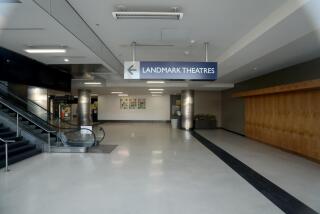House Calls for Homeless : Students, Families Benefit From One Another
- Share via
A crew of fresh-faced, physcians-in-training filed into a Westwood family shelter, donning lab coats and whipping out stethoscopes.
Pulling out trays of vaccines and antibiotics, the medical crew quickly created a makeshift clinic in the shelter’s stark but spacious common room--a place where homeless residents spend afternoons gathered around the television, chatting or washing laundry.
The students hold the clinic every other Saturday at the Salvation Army’s Westwood Transitional Family Housing Village, a shelter that accommodates up to 15 homeless families.
The clinic was started several years ago by UCLA medical students who wanted to deliver basic health care services to the growing homeless population, while providing themselves with a unique, hands-on learning experience.
Under supervision of a faculty physician, medical students provide services such as routine checkups, immunizations, tuberculosis testing, treatment for upper respiratory infections and skin problems, family planning and contraception. Patients who need blood tests and X-rays are referred to UCLA Medical Center, which provides the clinic with pharmaceutical items and medical supplies.
By staffing and managing the clinic, students acquire hands-on training that they would not otherwise experience in a regular class.
“We don’t have the luxury of nurses here, like we would in a regular clinical setting,” said fourth-year medical student Simmi Dhaliwal. “We have to do everything ourselves, like give vaccinations or take the patient’s temperature.”
As patients began dropping in on a recent Saturday morning, medical students greeted them at the door, recorded their medical histories and performed physical examinations.
Victoria Lavariega, a mother of three who lives at the shelter, visited the clinic to get a checkup and vaccinations for her youngest son, Leonardo. Students had previously treated the 1-year-old for a throat infection and fever.
“It’s hard for us to go to other clinics because they’re far,” said Lavariega, who does not own a car. “When the students come, it helps us out a lot.”
During the visit, medical students took Leonardo to a makeshift exam room, partitioned off by mauve wall dividers. Medical student Nicole Pham placed the boy on a donated exam table and gave him a thorough physical examination, checking his eyes, ears and throat for any signs of infection. Then, as the child unwittingly looked away, he received a shot in the arm of measles vaccine. Crying and struggling, he was placed back in his mother’s arms.
Lavariega, who is currently unemployed, has gone to the clinic for the last 10 months to receive medicine for her stomach cramps and checkups for her three sons. Other families have used the facility even longer.
“We’ve been seeing some families now for over a year,” said Linda Sakamura, a fourth-year medical student. “We’ve see some of the kids grow out of diapers. There’s continuity of care, which is really important in establishing a strong doctor-patient relationship. As doctors-in-training, we’re learning to establish that bond.”
Program Director Dr. Richard Usatine, who volunteers his time supervising the students, said that virtually every family that spends time at the Salvation Army’s shelter has visited the clinic for health care.
Usatine, who has been faculty adviser for the program since it began in 1990, said the clinic began with 20 student doctors and has grown to 60 in the last year. “Every year, we have more students interested in participating,” Usatine said.
Because of growing interest, clinic organizers are working on plans to expand the program by adding dental and mental health services, he said.
“In this program, students learn about community service and gain practical field experience by working with real people with real needs,” Usatine added. “This is what the practice of medicine is all about.”
More to Read
Sign up for Essential California
The most important California stories and recommendations in your inbox every morning.
You may occasionally receive promotional content from the Los Angeles Times.













